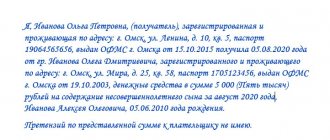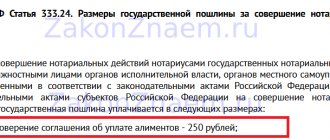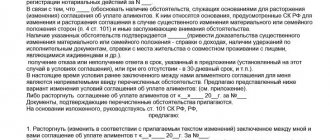Divorce of spouses should not prevent a child from communicating with one of the parents who lives separately after the divorce.
The legislator determines that such a parent has the right to communicate with the child and participate in his upbringing. At the same time, the parent with whom the child lives is obliged not to interfere with such communication.
Thus, the child retains the right to receive love and care from both parents, despite the fact that they are divorced and living separately.
Read the article about establishing the order of interaction between a child and a parent after a divorce.
Parent's rights after divorce
In addition, the rights of parents to children after a divorce remain the same as they were during marriage. But a number of difficulties may arise with their implementation.
A parent who leaves the family retains the right to:
- obtaining information about the child’s health, academic performance and life;
- making decisions about education or treatment;
- communicating with the child, spending time together with him;
- other actions necessary to fulfill their parental responsibilities and exercise their rights.
Expert opinion
Stanislav Evseev
Lawyer. Experience 12 years. Specialization: civil, family, inheritance law.
The main problem in establishing interaction between parents is their hostile relationship caused by the breakdown of the relationship. The child suffers from such conflicts.
In defense of his interests, it is much easier to refuse to settle scores and agree on the fulfillment of one’s duties peacefully.
What aspects can be set in it?
The main purpose of concluding such agreements is the voluntary settlement of all issues relating to common children.
Its text may contain the following provisions:
- on the maintenance of children until adulthood;
- about their residential address;
- about participation in their upbringing, maintenance of a separate parent;
- on the exercise of parental rights.
All of these provisions can be reflected in one document at the same time . The parties also have the right to agree separately only on some of the above points.
You can enter into several agreements for each of the grounds or for different children. When concluding them, the principle of voluntariness applies.
Spouses can include in the document any points on which they have reached a common opinion. At the same time, they should not infringe on anyone’s rights.
Important! When resolving issues about children, spouses should also be interested in their opinion when they reach the age of ten.
Settlement agreement and agreement for children - what is the difference?
Any agreement regarding the upbringing of children is often called a settlement agreement. From a layman’s point of view, everything is clear - the parties make peace and agree on paper about mutual rights and obligations.
However, a nuance is important here: a settlement agreement is a consequence of resolving a legal dispute; it is concluded in court and approved by the court. Such as, for example, a settlement agreement to determine the child’s place of residence.
All other agreements reached and sealed by parents on paper cannot, from a legal point of view, be called a settlement agreement.
A voluntary agreement on children is drawn up without the participation of judicial authorities and is subject to notarization.
Is it possible to make changes to the agreement?
The agreement on the procedure for raising and maintaining children, like any other agreement, can be changed. This requires the will of both the mother and father.
Important! The agreement is amended in the same way as it was concluded, that is, through a notary. A simple written document will not be enough!
There are two ways to change the terms of a child-rearing agreement:
- Conclusion of a new document. In this case, the old one loses its legal force.
- Drawing up an agreement to amend an existing document.
The notary will accept and certify changes only if they do not contradict the interests of the child. Otherwise, you will have to appeal his refusal in court.
How to draw up and write an agreement correctly
There are no special requirements by law for drawing up such an application. However, due to the fact that the document involves defining three important areas of parental relationships at once, it is hardly possible to draw it up without the help of a lawyer.
The Family Code does not establish requirements for such an agreement. Certain provisions are prescribed in Art. 100-101 of the RF IC for alimony agreements.
Parents will have to be guided by them when concluding a comprehensive message about children, containing the issue of child support obligations.
Form
The agreement is made in writing. The mandatory requirement for notarization is stated only in Art. 100 of the RF IC regarding parental agreements on the payment of alimony.
The principle “From the particular to the general” applies here - a comprehensive agreement between the parents, which considers issues of communication and education along with alimony, will have to be certified by a notary.
You can avoid notarization of the contract by excluding the provision on alimony.
Important! No one and nothing prohibits parents from sealing the agreement reached with a notary even without mandatory requirements in the law. But the notary will in any case check the agreement for compliance with the law.
If the agreement contains illegal conditions, restrictions or other provisions that violate the rights of the child or one of the parents, such a document will not be certified.
Contents, composition
For a document regulating the relationship between parents in raising a child, the following list of required details can be determined:
- date and place of conclusion of the agreement;
- Title of the document;
- FULL NAME. parents, their passport details, registration addresses and places of actual residence;
- FULL NAME. the child, his date of birth (raising the child is the “subject” of the agreement);
- terms of the agreement, restrictions, procedure;
- personal signatures of the parties, date of signing.
These are mandatory document details. But with the conditions, everything is much more complicated - there can be dozens of them, touching every area of the child’s life.
| No. | Approximate conditions |
| 1 | The procedure for parent participation in health care matters: choice of a medical institution, issues of vaccination, health improvement, active recreation, rehabilitation |
| 2 | Discussion of child development: choice of preschool institutions, sports sections, clubs |
| 3 | Procedure for communicating with a parent living separately with a minor |
| 4 | The procedure and methods for monitoring progress, quality of education, joint or separate classes of a child with mom and dad |
| 5 | Place of residence of the child |
| 6 | Issues of material support (alimony, additional financial assistance) |
Parents can divide the areas between themselves. Mom may be responsible for treatment, father - for sports development, sections and tourism. Everything is in the hands of the parents.
The rights and responsibilities of both parents in general are also spelled out.
Most often this concerns:
- notifying each other of their intention to spend time with the child;
- notifications of delays in the child's return or transfer;
- informing about various emergencies, injuries, problems;
- Arrival and departure procedures for long periods of time.
Parents determine the full terms and conditions of the document independently. The law does not establish any requirements here.
The only limitation is the protection of the children's interests and the interests of each parent. The document cannot strictly limit communication with a minor or impose a ban on meetings.
A competent lawyer who will correctly formulate all the conditions can help in creating an exhaustive list of conditions.
Additionally, the conditions, duration and procedure for communication between the child and close relatives of the parent who does not live with the child may be stipulated.
We are talking about grandmothers, grandfathers, sisters, brothers (not including full-blooded ones). Restrictions based on desire alone are not allowed; relatives also have the right to communicate with the baby, as prescribed by law.
Limitations in the agreement
In addition to establishing the procedure for interaction between parents on various issues, the document may also reflect restrictive conditions.
Some of them may be related to the health or personal qualities of the child:
- restrictions on travel into nature due to an allergy to mosquito bites;
- a ban on riding high-altitude rides due to the child’s fear due to an earlier incident;
- restrictions on visiting cafeterias and restaurants due to food allergies or diseases of the gastrointestinal tract.
A parent who takes a child for a joint holiday is obliged to follow all the conditions with which he agreed. Violating them (especially intentionally) can result in termination of the agreement and a breakdown in communication with the child. Up to the deprivation of parental rights (if his actions pose a threat to the normal development of the child).
The document also specifies restrictions on the time and periods of communication with the child.
It can be:
- day or time restrictions for the parent;
- an indication of the minimum or maximum number of meetings or contact hours;
- a list of days of “unconditional” communication and days when the second parent will not be able to communicate with the child.
As mentioned above, the agreement between the spouses is free and the main requirement for all conditions is the absence of unreasonable restrictions and violations of the rights and interests of both the child and any of the parents.
Example . It is impossible to limit communication between a father and a child at the request of the mother. But it is reasonable to establish a ban on traveling outside the city on weekdays - this way the minor will be guaranteed the opportunity to study peacefully.
Arbitrage practice
The case was heard in the Kirovsky District Court of Astrakhan in July 2021.
According to the plot of the case, the father of the minor acted as the plaintiff, who made the following demands to the court:
- By agreement with the defendant, his child remained to live with his mother, but she does not allow him to see his daughter. Any attempts to reach an agreement must be refused.
- In this regard, it is necessary to set meeting times from 10:00 Saturday to 19:00 Sunday weekly.
- In addition, the defendant must not interfere with seeing his daughter on the plaintiff’s territory during the period of time specified in paragraph 2.
The defendant did not come to court and did not present his objections.
Based on the evidence presented by the plaintiff and the conclusion of the guardianship institution, the judge decided that, according to the current legislation, he is obliged to agree with the father’s claims, since the defendant did not provide evidence indicating that the father could negatively influence the girl. In addition, employees of the guardianship institution examined the father’s apartment and became convinced that it was favorable for a minor to stay there.
Alimony and maintenance
Theoretically, parents can agree on child support on a voluntary basis without giving the document executive force.
But such an agreement is valid as long as both parents fulfill it in good faith.
If the father pays child support, and the mother argues otherwise, or the father evades payment, he will still have to go to court. The notarized agreement can be submitted to the FSSP for forced collection of funds for the child.
Read more about how to properly formalize voluntary payment of alimony.
Order of communication
Parents, according to the provisions of family law, have equal rights and obligations.
However, most often, in a divorce, one of them remains with the children, while the other lives separately.
At the same time, he should be given the opportunity to freely meet with children, receive all information about their lives, and participate in it.
Therefore, the question arises about regulating the order of communication between the departed parent and the children.
In addition, parents need to agree on the rules for raising children together and participating in their financial support. How and where you can draw up an agreement on children upon divorce, as well as its sample, we will consider further.
Firstly, even before the divorce, spouses can draw up a document that resolves all issues related to children after the divorce. It is better to record the agreements reached on paper. It will be even more reliable to officially certify the document drawn up by a notary. Spouses have the right not to present it to the court during divorce proceedings, indicating that they do not have a dispute regarding the upbringing, residence and maintenance of children.
Secondly, the resolution of this issue can be taken to court. Spouses can submit the agreement they have drawn up to the judge for review. If there is none or it is recognized as violating the interests of one of the spouses and (or) children, then the court considers these issues on its own initiative. When considering a divorce claim, you must:
- determine which parent the children will live with;
- determine the amount and procedure for payment of alimony payments.
Often, ex-spouses not only do not submit any documents to the court, but also heatedly argue about the exercise of their parental rights.
Then, at the request of one of them, this issue is resolved by the court with the involvement of the guardianship authorities.
Based on all the circumstances presented by the parties and the opinion of the guardianship representative, the court makes its decision determining the procedure for the former spouses to exercise their rights.
However, the parties during the review process can come to a common opinion and enter into a settlement agreement.
Below is a sample settlement agreement between parents to determine the child’s place of residence.
Thirdly, after the decision on divorce, spouses have the right to enter into agreements on the exercise of their parental rights. They can reach any agreements that do not contradict the law and children's interests. To resolve issues regarding the joint upbringing of children and their place of residence, a simple written document may be drawn up.
Important! If the agreement resolves the issue of alimony payment, then it requires notarization. Otherwise, it cannot be applied due to its insignificance.
This requirement is contained in Article 100 of the Family Code of the Russian Federation. In addition, it states that an alimony agreement certified by a notary has the force of an executive document. This means that if its conditions are not met, you can apply for the collection of alimony payments directly to the bailiff service.
Refusal of a parent to comply with the terms of a court order
If a parent living with a child violates the terms of a court order or settlement agreement, the injured party can contact the FSSP employees. The task of specialists is not only to ensure the protection of the rights and interests of the parent, but also to prevent trauma to the emotional state of the child.
The bailiff conducts a conversation with parents in order to identify why the conditions of the communication order are not observed. On his own initiative, a FSSP employee has the right to use the help of social workers, teachers, and psychologists. Moreover, these specialists may be required not only for the child, but also for the parents.
If difficulties arise only because the parent himself refuses to comply with the conditions (and not when, for example, the child does not want to see his estranged father/mother), then he will face responsibility - for example:
- a fine of up to 3 thousand rubles (for repeated violations - up to 5 thousand);
- administrative arrest for up to 5 days;
- fee for missing the deadline to fulfill the terms of the writ of execution – 5 thousand rubles.
In difficult situations, the child may be taken away from the offender and placed in the care of another parent if this is in the interests of the minor.
An FSSP employee has the right to ensure only the order of communication between a parent and a child that is fixed in a court ruling or a settlement agreement. He cannot set any other additional conditions. If specialists cannot ensure compliance with the communication procedure specified by law, then the parent has the right to file a complaint against a specific FSSP employee in court.
Additional terms of agreement
Also, parents, at their discretion, can establish:
- duration of the agreement;
- dispute resolution procedure;
- procedure for termination and amendments;
- liability for violation of the terms of the agreement.
Please note: the agreement determining the amount and procedure for financial support of the child must be certified by a notary. In other cases, mandatory notarization is not required (at the request of the parties). When determining the amount of payments, it should be taken into account that their amount cannot be less than 25% of the payer’s monthly income for one child, 33.3% for two children, 50% for three or more children.
If you are interested in how to draft a child support agreement, read this article.
Facebook








